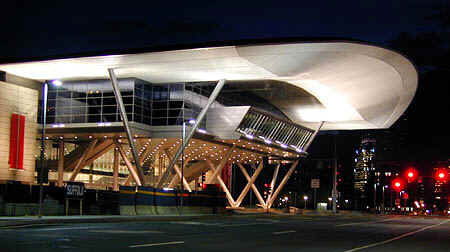Our View: Keep the Hotel Subsidy Out of the BCEC Expansion Bill
Today (Thursday), the Massachusetts State Senate is planning to vote on the proposed $1 billion expansion of the Boston Convention & Exhibition Center. Pioneer has been working hard to shine the spotlight on problems with the project.
The good news is that added public attention helped bring about a revision in the Senate Ways and Means draft, removing the $100 million hotel subsidy that Pioneer found troubling.
Last week, Boston Globe columnist Jeff Jacoby wrote about our concerns that the Massachusetts Convention Center Authority (MCCA) would have been allowed to select a developer to build and operate a 1,000- to 1,200-room hotel on land owned by Massport, with $110 million in public subsidies. There is no provision in the bill requiring MassPort and MCCA to award the hotel contract to the qualified bidder with the highest bid, or the lowest subsidy bid.
In response to Jacoby’s column, MCCA Executive Director James Rooney sent a letter to Greg Sullivan denying any knowledge of the hotel subsidy, claiming the funds were never meant for that purpose. But in a follow-up Globe story, Casey Ross reported that the Senate was sufficiently concerned that a committee removed it from the bill.
The “hidden hotel subsidy” must remain out of the BCEC expansion legislation that the Senate passes.
In addition to the hotel subsidy, Pioneer has raised other objections to the project, which have been aired in:
- Boston Herald: Chieppo: New convention center math
- NECN: Boston Business Journal Report: Convention center expansion
- Boston Business Journal: Be warned: The convention center’s forecasts have missed the mark
- The Boston Globe: The Massachusetts House Approves Convention Center Expansion Plan
- WGBH Commentary: Does Expanding The Convention Center Make Economic Sense?
- BNN News Interviews Charles Chieppo, Pioneer Institute
- WRKO: Barry Armstrong talks with Charles Chieppo
Read our additional concerns below, authored by Pioneer Research Director Greg Sullivan:
- Allows public subsidies to be given to the hotel developer in an unlimited amount, with no further legislative oversight or public approval, conceivably in excess of $100 million. In other jurisdictions, the public or legislature has to first approve the subsidy amount and in many instances have turned it down. The Senate Committee on Bonding, Capital Expenditures and State Assets approved an amendment to the bill to limit subsidies, but the Senate Ways and Means Committee stripped this language from its version of the bill.
- The legislation authorizes $1.1 billion in state-issued bonds but cedes control of the proceeds to MassPort and MCCA, eliminating legislative ongoing oversight and control usually imposed on state issued bonds.
- The legislation as approved by the Senate Ways and Means Committee allows the Mass. Convention Center Authority to disregard state procurement laws that otherwise govern the construction of public buildings, eliminating key safeguards.
- MassPort and MCCA’s original legislation proposed that MassPort and MCCA officials be exempt from the state conflict of interest laws with regard to personal financial interests in any aspect of the MCCA expansion deal that existed prior to the effective date of the Act, allowing them to continue. To Chairman Dempsey’s credit, House Ways and Means stripped this outrageous proposal from the bill.
- Allows MassPort and MCCA unprecedented secrecy to shield from the public and state details of the contract and subsidy. State law already allows for proprietary secrets to be protected.
- Virtually all downside risk falls on the taxpayers. Upside potential go to the hotel developer. During the past decade dozens of convention headquarter hotel deals have been unsuccessful. Shortfalls paid from public resources.
- Expands the prevailing wage law to include security guard services, in perpetuity.
- Makes the hotel and convention center project subject to a project labor agreement, adding at least 10% to the total cost.
- Relies on exaggerated assumptions about expected occupancy, relying on MassPort and MCCA studies, without independent, arms-length verification.


